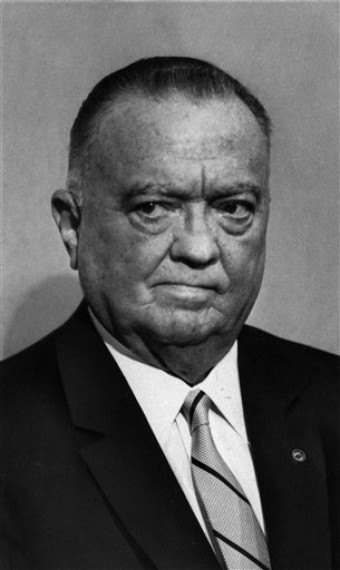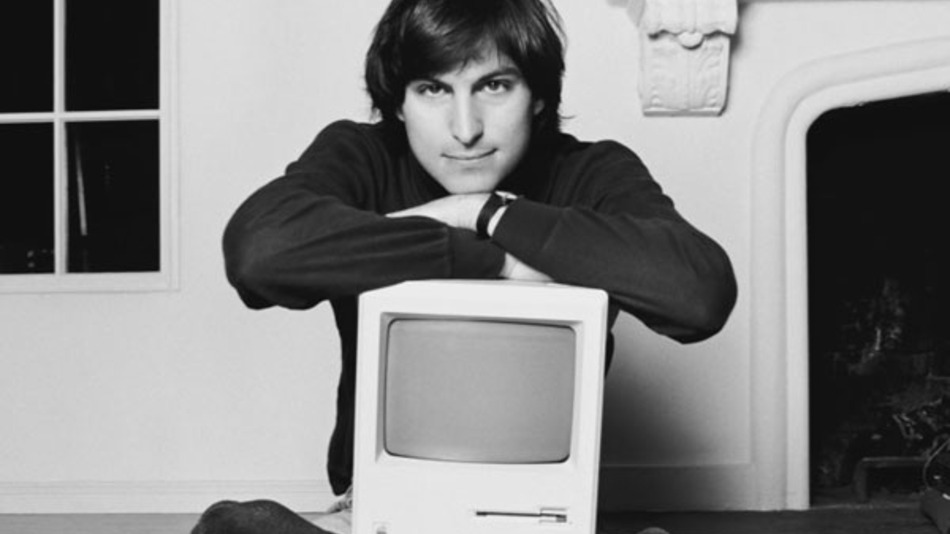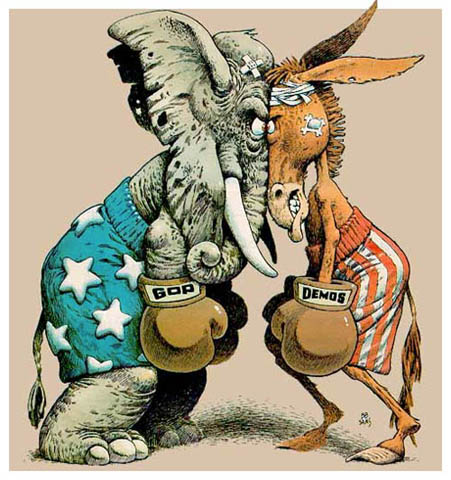
I have recently (within the last month) read two books on the man known as J. Edgar Hoover.
He was evil.
As a writer, I strive to create really good bad guys. Antagonists must be authentic, not your everyday, I’m-gonna-take-over-the-world-for-no-reason-other-than-I’m-a-megalomaniacal-megalomaniac type bad guys. I strive to make them three-, four-, even five-dimensional. If they appear human, and are lovable, and hatable, I feel accomplished.
One way I try to get the readers to love my bad guys is by making the bad guys’ goals charitable, noble, worthy, and honorable. If I have the bad guys trying to accomplish something that is right, or that they think is right, I’ve got a even more conflict for the reader. “Is the good guy doing the right thing? Is the bad guy going to win? Do I want the bad guy to win? Do I want him to lose?”
Readers eat that stuff up. They like to worry about the characters. (At least that’s what all of the books on writing fiction tell me.)
Either way, J. Edgar Hoover would make the best bad guy ever!
John Edgar Hoover was born in Washington D.C., January 1st, 1895. Quite punctual, as usual. Well, he hadn’t any “usual” yet, as he was just born, but… well, it set the standard I guess. He lived in the same house for the first 43 years of his life, a very Hoover-esque thing to do.
He was a good kid, always kept his nose clean. “As a youth I was taught basic beliefs,” said Hoover. “For instance, I was taught never to put another book above the Bible.” Hoover never drank with any of the other high school students, instead he found companionship with his family.
Another lovable quirk was the fact that he had a stutter. As a perfectionist, he knew this was unacceptable. In order to avoid it, he developed a machine-gun-like manner of speaking. (Awwwwww! Iddindatsocute?)
After graduating high school, Hoover took a job as a messenger and file clerk at the Library of Congress. He learned the incredibly complex card-index system, and learned it with a hunger. He worked at the Library for four years while earning a degree in law at George Washington University.
Hoover was a man with a plan, and a man with a purpose. Many recall that he seemed more purposeful than most anyone else. His niece, and superiors were among the ones specifically quoted in the books.
In July, 1917, he his law degree, and took as a clerk in the Justice Department (JD). Within three months, he had gotten a promotion. Over the next seven years of his career at the JD, Hoover would get promotion after promotion. After two years on the job, he was considered the JD’s expert on aliens.
In August, 1919, Attorney General A. Mitchell Palmer appointed Hoover the head of a new division, the General Intelligence Division (GID). Its job was to “research” (spy on) political groups that the government deemed too radical, and thus dangerous. U.S. political groups!
Using his index-card experience, Hoover created a filing system for the GID. The index contained information on 100,000 individuals who were considered political extremists. Within a few months this file had grown to 200,000 individuals. By the files third year of existence the number exceeded 450,000. Not content with this list, Hoover created a list of the 60,000 most dangerous.
I’d like to point out that this man was already overreaching his bounds. The GID is a department of government that is highly unnecessary, and I believe is part of the reason Hoover was in on the Watergate Scandal. He felt that the government had power, and he was twisted by that power. Twisted so much, that he did things that he never should have done. Watergate was just one of those things.
Hoover also hated communism. Another good point in this strange man. He wrote, “Communism is the most evil, monstrous conspiracy since time began.” He preformed a study on it, and quickly established himself as the nation’s number one authority on the subject.
Look up the “Palmer Raids”, and you’ll see what kind of control freak Hoover was. Hoover was in charge of planning them, and the total control factor really shows up. He arrested many, many, many people on suspicion, and it was one of the most shameful times in America. America is a country that advertises freedom, but this was an act worthy of some Nazi, or Communist state.
One year after the Palmer Raids, in August, 1921, Hoover, just 26 years old, was named the assistant director of the Bureau of Investigation (the FBI before the F, which is followed by “ederal”).
Now, before we go any further, I should explain about the old Bureau. The one with BI for it’s initials. (BI stands for Bad Intellect)
The bureau was a place that was full of irregularities, such as a system used in one Field Office, but no system whatsoever in another Field Office. The Agents were awful, getting into trouble left and right. Drinking a lot, and even drinking while on the job. The FBI, I mean BI, was finding more criminals inside its walls than outside. Hoover was ticked.
He set out from day one to fix the BI’s horrible system. He was taking over at a time when people where beginning to seriously question the bureau’s integrity. Image was everything to Hoover, and he was ready to get busy.
Hoover noticed an extreme lack of focus in the personnel, and made them one of the top most priorities. Yes, plural, the Bureau wasn’t a very well run organization. In fact, it wasn’t a very organized organization.
Hoover started by firing all agents who had a criminal past, or whose character was in question. Those who weren’t fired were retrained in “the way of the Hoover” as someone put it. Agents Hoover disliked, but he couldn’t fire without causing suspicion, where driven out by short-notice transferring. The agents reffered to it as being “on the bicycle.” Any agent on the short-notice list would be ordered to pack his bags and report immediately at his new post. It would go on and on until the agent resigned. Still others weren’t fired, but they quit because they didn’t want to work under the strict rules enforced by Hoover.
Hoover also installed an entrance exam. Citizens of the U.S. who were white males, between the ages of twenty-five and forty, had 20/20 vision, good hearing, and good health were eligible to apply. Those who had law or accounting degrees were given preference, as Hoover thought they’d be more professional in their evidence collection. Hoover believed the un-professionalism of the Bureau was the leading cause of its failure to win any cases.
Hoover was also the first directors to train the agents in the use of weapons. The agents were trained how to be an expert shot in revolvers, rifles, shotguns, and machine-guns. They were also taught how to launch tear-gas bombs accurately.
When Hoover became the director of the FBI (it was the FBI then), he set the standards to include all of the Bureau’s employees, including typists, file clerks, and lab techs. No drinking on or off the job. Unseemly behavior wasn’t tolerated. No coffee breaks, and personal property at desks was completely prohibited.
Hoover also installed a inspection system called the Internal Inspection Division. Agents from the IID would show up at Field Offices at least twice a year, and give out merits to FBI agents who preformed well, and give demerits to those who didn’t. Merits could result in a promotion or a raise, and demerits could result in a transfer to an unpopular location, and then finally to dismissal.
Hoover said, “I want the public to look upon the Bureau as a a group of gentlemen. And if the men here engaged can’t conduct themselves in office as such, I will dismiss them.” Before long, the agents were considered men of goodwill, and great character. This was due to the strict rules, and Hoover’s ever-watchful eyes. He found that the TV show, the FBI, had a scene in which an FBI agent was alluded to driving a little above the speed limit, and he ordered the speed reduced.
Each script for the show was reviewed by Hoover himself, and every detail during the filming process was watched by a hawk-eyed agent. If an actor held a weapon incorrectly the agent corrected him. If an actor had anything criminal in his past, he wasn’t allowed to act in the show. The actor that played Inspector Erksine was hand-picked by Hoover. Everyone that was on the set was background checked. Even the electricians, and the carpenters used to create sets, had to be cleared by Hoover.
All so that the FBI’s reputation would be saved. Hoover was a man who knew how to work the political system. Don’t back down. Stand your ground, and make sure you hold all the cards.
To close part one: Doesn’t Hoover sound so relatable. He works hard, he learns quickly, he’s simple, and he brilliant. He’s assertive, and meticulous. Maybe not your favorite boss, but he’d be a great son, right? Perfect, and self driven.
This adds to my bad guy analogy. Hoover was a very well kept citizen, who grew up in Washington, D.C. He was raised so that he had strong morals, and was fine man. He loved his country, and hated communism. So far, so good.
Hoover, as I have said, was a control freak when he took over the FBI, and that was something that would permeate the rest of his career. Overall, Hoover is likable, for the most part. He’s a good guy who fixed a corrupt FBI, right?
Wrong.
TO BE CONTINUED
 I’m not sure what it is about the Sun, but he just gets on my nerves. I don’t particularly dislike the light it gives, or the heat it gives, but just think this through with me.
I’m not sure what it is about the Sun, but he just gets on my nerves. I don’t particularly dislike the light it gives, or the heat it gives, but just think this through with me.


 Ice cream sandwiches are a hit in the Campbell home. And at just over 16¢ a piece, that’s not a bad price tag for a happy kid!
Ice cream sandwiches are a hit in the Campbell home. And at just over 16¢ a piece, that’s not a bad price tag for a happy kid!




